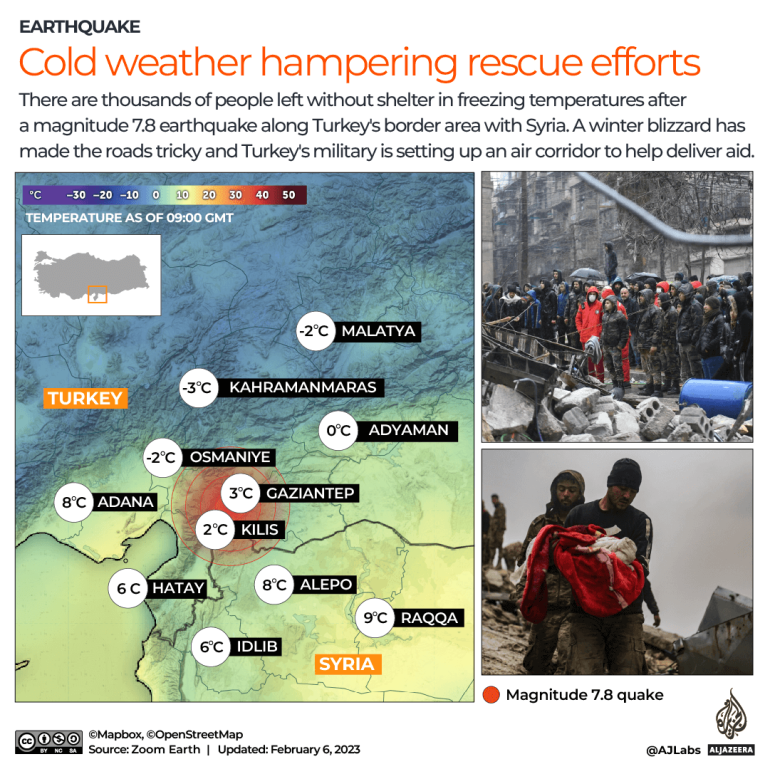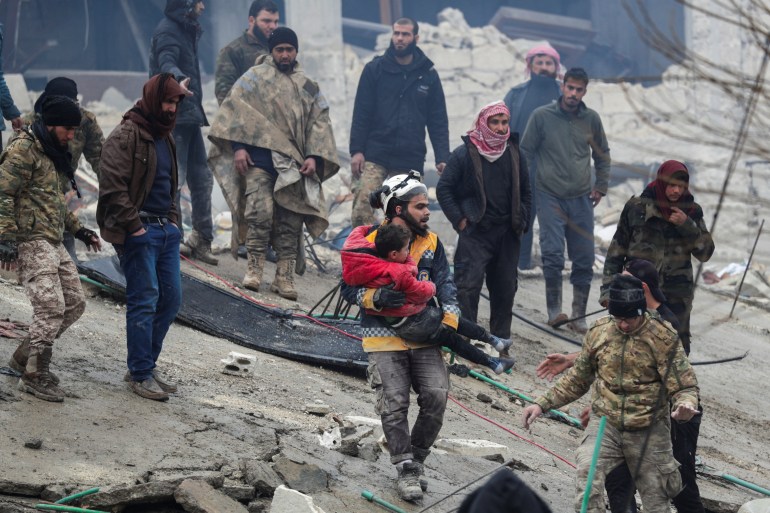Severe weather hampers earthquake rescuers in Turkey and Syria
Snow, rain and freezing conditions impede search and rescue operations as the quake death toll surpasses 3,000.

Bad weather is hampering rescue efforts after a magnitude 7.8 earthquake and its powerful aftershocks struck southern Turkey and northwest Syria, killing thousands of people and injuring many more.
According to the US Geological Survey, the earthquake struck at 4:17am (01:17 GMT) on Monday at a depth of about 17.9km (11 miles), leading to the collapse and destruction of buildings across the region. It was also felt in Cyprus and Lebanon.
Keep reading
list of 4 itemsWhat we know about the powerful quakes that hit Turkey, Syria
Photos: Hundreds dead after strong earthquake rocks Turkey, Syria
Major earthquakes kill thousands of people in Turkey and Syria
In addition to the devastation from the earthquake, Turkey’s Vice President Fuat Oktay said authorities were also struggling with “extremely severe weather conditions”.
“We are trying to reach the region as quickly as possible,” Oktay told the media.
Structural geology expert Chris Elders explains why the magnitude 7.8 earthquake in southeast Turkey and northern Syria has caused such devastation ⤵️ pic.twitter.com/68mrYeDGDS
— Al Jazeera English (@AJEnglish) February 6, 2023
Al Jazeera’s Sinem Koseoglu, reporting from Istanbul, said harsh winter conditions made the situation on the ground “very difficult”.
“Everywhere there is snow or rain, and it’s very cold … the weather conditions and the climate is making it very difficult for the rescue workers and civilians,” she said. “It seems to be the biggest challenge for everyone.”
TV images of rescue operations in the southeastern Turkish city of Diyarbakir showed dozens of rescuers and volunteers searching through rubble in their winter jackets and face scarves with snow on the ground as they desperately searched for survivors.

Al Jazeera’s Zeina Khodr, reporting from Beirut, Lebanon, said “a severe storm” has hit northern Syria.
“It’s cold, and many people have lost homes – they’re out in the open, and already the north of Syria is home to millions of people who live in tents,” she said.
“So, this is an emergency that is not going to be easy to deal with,” she added.
"Many families are under the rubble."
A rescue worker in rebel-held northwest Syria has called on the international community for urgent help after a deadly 7.8-magnitude earthquake ⤵️ pic.twitter.com/pKZH8L5cZo
— Al Jazeera English (@AJEnglish) February 6, 2023
‘Horrifying’
Alaa Nafi, from Idlib city in Syria, described the earthquake as “extremely horrific and terrifying”.
“Waking up in the middle of the night to the entire building shaking was the worst feeling ever and made it very hard to escape,” he told Al Jazeera.
“Seeing the people with children out on the streets crying in cold weather was heartbreaking, but we all congregated in one area away from all the buildings,” Nafi said.

Al Jazeera journalist Ahmed al-Khatib, who was in the Turkish town of Gaziantep, said many people were “standing outside in the cold” since the earthquake until some of the mosques opened their doors allowing people to take shelter from the freezing conditions.
He however said many people did not feel safe in buildings amid strong aftershocks. “You can see whole streets filled with cars and people sitting inside them,” he said.
“It’s like a nightmare and we wish that we can get out of it,” he added. “It is indescribable.”
Authorities said the death toll was likely to rise, while experts warned that aftershocks could continue for days or weeks.